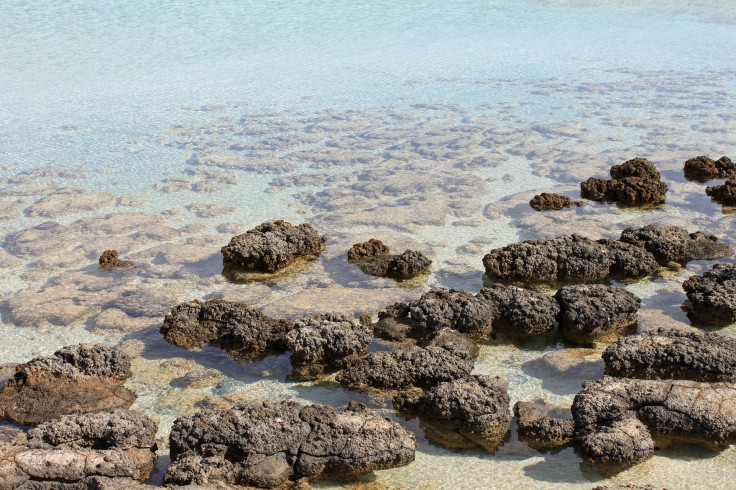When Did Life On Earth Begin? Scientists Say It Started On Land, Not Sea

Evolution experts have long believed that life on Earth formed in the vast ocean, before one day a brave creature took that fateful first step onto land and started a chain of events from which the human race rose. But scientists are constantly investigating and learning more about the history of life, and one group is saying our perception of how it began on our planet is wrong.
A group of researchers has asserted that life actually formed first on land before migrating into the ocean, although the land environment was still relatively wet. Stromatolites were a key clue for these researchers.
Read: Orion Constellation Has Clue About Early Earth Life
Stromatolites can be thought of as topographical fossils, or even prehistoric graveyards — they are rounded mineral structures whose numerous layers are composed of the remains of some of the world’s first life forms. They can be found in shallow waters and were built up when bacteria and similar microorganisms got sediment trapped in their protective layers called biofilms.
They “range from the size of golf balls to weather balloons and represent the oldest evidence that there were living organisms on Earth 3.5 billion years ago,” the University of California, Santa Cruz, explained.
But even though the stromatolites can be found now in shallow, salty waters, new research is suggesting that they formed in a hot spring-type environment, like the kind you would find at Yellowstone National Park in Wyoming, that only later transformed into how we see it today.
Researcher Tara Djokic, from the University of New South Wales, found evidence that stromatolites in the Pilbara region of Western Australia formed in fresh water, according to UC Santa Cruz. That would mean life was on land 580 million years sooner than originally thought.
Many experts believe that life began deep down in the sea, where features called hydrothermal vents spit out heat, minerals and other material that could have helped kickstart life. But the new model this team of scientists is proposing focuses on what is like a land-based version of those vents: hot springs.
A hot spring is an opening through which groundwater that has been heated by the Earth emerges to the surface. That heat could have come from magma — the molten rock that is called lava after a volcano spits it out — or simply from the natural heat that occurs at the depth inside the Earth where the water originated.
Even today, microorganisms like bacteria and algae thrive in these hot environments.
According to Santa Cruz astrobiologist David Deamer, salty seawater might not be an ideal environment for life to form, one of his criticisms of the geothermal vent theory that the hot springs idea would solve.
However, other research has suggested that Earth’s ocean water was not as salty in prehistoric times as it is now. Today’s ocean typically measures an 8 in pH, the scale that runs from completely acidic at 0 to entirely alkaline at 14, in which 7 is a neutral number. But around the time life was forming it may have been more acidic, perhaps a 6.5, which is closer to the quality of urine, saliva or milk.
Read: When the Earth Was Flat
“The model for life beginning on land rather than in the sea could not only reshape our idea about the origin of life and where else it might be, but even change the way we view ourselves,” the university said.
The team of scientists created a model for how life could have formed on land: On volcanic landmasses throughout Earth’s massive prehistoric ocean, rainfall would go through hot and cool cycles, thanks to heat from within the Earth. As the landmasses fluctuated between wet and dry, organic material was building up in the pooled fresh water and forming into compounds until there was a spark of life and a community of microorganisms emerged.
Even if life began underwater rather than on land, the researchers say, the model still suggests there were living organisms on land earlier than thought.
“I think, every once in awhile, you have to be brave enough and bold enough to try new ideas,” Deamer said. “Of course, some of my colleagues think even ‘foolish enough.’ But that's the chance you take.”
© Copyright IBTimes 2024. All rights reserved.





















